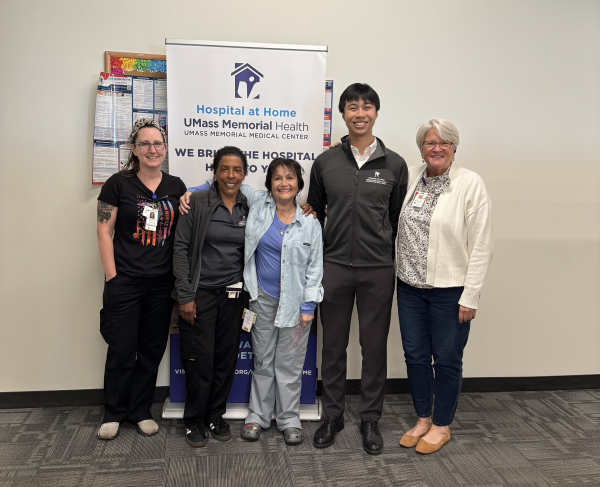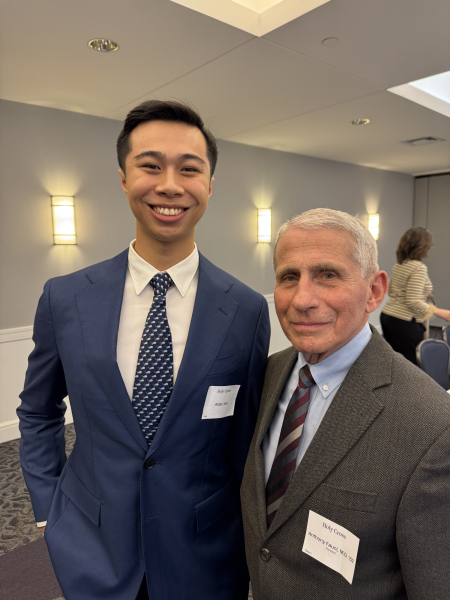‘My eyes have been opened to the possibilities in medicine’: Aidan Tam’s clerkship at UMass Chan
2025年7月8日

Aidan Tam
MCBhB Medicine, Year 4Aidan Tam is a local MBChB student at Morningside College, entering his fourth year of studies. In this interview, Aidan speaks with the College about a recent medical clerkship that took place over the summer, and how his experience has shaped his plans for the future.
You've recently returned from a seven-week medical clerkship at University of Massachusetts's T.H. Chan Medical School – can you describe the experience?
During my clerkship, I had the unique opportunity to contribute to the Massachusetts AI Assurance for Healthcare Lab (MAIAH Lab), which is dedicated to advancing the responsible use of artificial intelligence in healthcare. In addition to my work at the MAIAH Lab, I spent Wednesdays offsite with the Hospital at Home team—an innovative program offered by UMass Hospitals that delivers hospital-level care to patients in the comfort of their own homes. I supported the proactive patient recruitment process by reaching out to eligible patients either by phone or in person, introducing them to the program and conducting screenings to help streamline their intake.
This was my first time participating in any form of medical research. I can’t find one word to encompass the whole seven weeks, but I truly believe it was a life-changing experience for me, professionally and personally. Being able to contribute to research that actively advances the field of medicine was something that, prior to this, I’ve only dreamt about.
How did this opportunity come about?
It all started here at Morningside, when I received an email asking if I’d like to join Professor Rawlins in the Master’s Lodge for tea with Dr. Gerald Chan and Dr. Michael Collins, the chancellor of UMass Chan Medical School.
Several other medical students were invited as well, but as a second-year student I was the most junior one there. I was definitely quite nervous. But over tea we started talking about medical mysteries, or unknowns in the field of medicine, and when I shared my perspective I felt like my voice was being heard. Afterwards, Dr. Collins gave me his contact card.
I was eager to get in touch with him, and so I reached out via email just to see if there was any chance we could further the dialogue. I thought maybe I could visit UMass Chan. Both Dr. Collins and Professor Rawlins were incredibly encouraging, and over the course of a few conversations the idea for a clerkship took shape. There was a lot of behind-the-scenes work from the College leadership here at Morningside and at UMass Chan to make this experience happen, and the encouragement and support I received was overwhelming.

With the Hospital at Home team, composed of the most caring nurses and case managers!
What was it like on a day-to-day basis?
It was a very enjoyable experience working in a lab for clinical research. It wasn’t a wet lab, which is what I typically imagine when I think of a medical lab, but more like an office environment. It was also super collaborative. In both projects, I got to feel like I was a team member and not just shadowing others. Even though I was coming from another medical environment with a different patient culture, my knowledge and perspectives were welcomed.
At the MAIAH Lab specifically, my work involved developing evaluation protocols for early-stage assessment of AI models used in healthcare settings. We aimed to create frameworks to ensure that AI technologies in healthcare are not only effective, but also safe, transparent and equitable. At the end of the day, we want to make sure that the use of AI is going to be patient-first, that by using AI we do no harm and abide by the bioethical codes we learn in medical school. There was a constant interflow of ideas, and I learned a lot.
Was there a specific moment that stood out to you?
With the Hospital at Home team, I was given the responsibility to call patients directly and see if the program was suitable for their needs. There was one patient who had been hospitalized for an infection and had recently lost his wife. He also had a history of depression. So, for him and I to work out if the Hospital at Home program would be beneficial, I really had to be there for him as a listener. Being able to provide that reassurance for him, and having him know that I was there to listen and to help him, made me feel proud of being a medical practitioner.
Another highlight was being able to speak with Dr. Anthony Fauci, who was participating in a panel discussion with Dr. Collins and other medical professionals. Dr. Fauci’s involvement throughout COVID as the chief medical advisor to President Biden resonated with me personally, because my mother was also involved in public policy here in Hong Kong working on infection control and hotel quarantine measures, and I know there are so many difficulties to navigate. And after the panel discussion I actually got a chance to share that with Dr. Fauci, and it was really inspiring to hear him talk about his experience of managing the health of essentially the entire United States.

A true honor to meet Dr. Anthony Fauci after he spoke at a panel discussion at the College of the Holy Cross. His insights on public health were unforgettable.
What is something you've carried with you back to Hong Kong?
My eyes have really been opened to the possibilities in medicine. Instead of just thinking about an individual career in healthcare, my perspective has broadened. Whether in Hong Kong or the United States, we’re pursuing the same interest, which is essentially medical innovation to continue improving healthcare in the best interest of patients. So now I’m asking myself: how can I really apply myself in this field, to contribute and make a substantial change towards this overarching goal?
My interest has always been orthopedic medicine, but now that I’ve seen how one’s career path can intersect multiple specialties and fields, and seeing the role that new technology is playing, I’ve been reflecting a lot on how myself and other students in this generation can redefine our role as medical practitioners.
More concretely, as a medical student from Hong Kong, I was especially struck by how underdeveloped current regulations are compared to the pace of innovation. This realization sparked a deepened interest in the emerging field of Health AI governance. My time at the MAIAH Lab also prompted me to reflect on how I can contribute to establishing a similar AI assurance and governance network in Hong Kong, fostering local capacity to ensure responsible deployment of AI in healthcare settings, advocating for systems that are transparent, trustworthy, and centered on patient safety.
Is there any advice you’d like to share with Morningside’s students?
Well, something I’ve really taken away from this is that you must always stay proactive about your learning and your career development. I’ve received overwhelming support from Morningside College, and I definitely felt that both here and at UMass Chan, which, like Morningside is supported by philanthropy from the Morningside Foundation and the Chan family, there is huge support for student education and making opportunities possible for students.
I remember during my first conversation with Dr. Collins over Zoom, when the idea of a clerkship was still forming, he held up a plaque that was on his desk and asked me to read it. It was a quote his mother would always say to him, and it read: “First you have to want to; then you can.” I want to share this with the students. There’s so much support for you here to pursue your ambitions, but first you have to want to, then you can.
